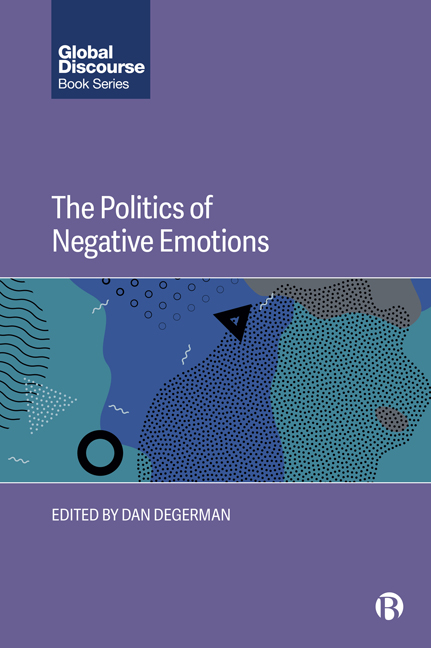Book contents
- Frontmatter
- Contents
- List of Figures
- Notes on Contributors
- Introduction: Feeling Our Way through Politics
- 1 Anger, Fast and Slow: Mediations of Justice and Violence in the Age of Populism
- 2 ‘We Will March Side by Side and Demand a Bigger Table’: Anger as Dignity Claim
- 3 Moving between Frustration and Anger
- 4 The Resentment– Ressentiment Complex: A Critique of Liberal Discourse
- 5 Green Shame: The Next Moral Revolution?
- 6 Against Comfort: Political Implications of Evading Discomfort
- 7 For Love and for Life: Emotional Dynamics at the World Congress of Families
- 8 The Functionality of Affects: Conceptualising Far-Right Populist Politics beyond Negative Emotions
- 9 Moral Economies of Exclusion: Politics of Fear through Antagonistic Anonymity
- 10 Contesting the Politics of Negative Emotions in Educational Policy Making: A Ban on Asylum Seekers’ School Visits in Finland
- Index
3 - Moving between Frustration and Anger
Published online by Cambridge University Press: 18 January 2024
- Frontmatter
- Contents
- List of Figures
- Notes on Contributors
- Introduction: Feeling Our Way through Politics
- 1 Anger, Fast and Slow: Mediations of Justice and Violence in the Age of Populism
- 2 ‘We Will March Side by Side and Demand a Bigger Table’: Anger as Dignity Claim
- 3 Moving between Frustration and Anger
- 4 The Resentment– Ressentiment Complex: A Critique of Liberal Discourse
- 5 Green Shame: The Next Moral Revolution?
- 6 Against Comfort: Political Implications of Evading Discomfort
- 7 For Love and for Life: Emotional Dynamics at the World Congress of Families
- 8 The Functionality of Affects: Conceptualising Far-Right Populist Politics beyond Negative Emotions
- 9 Moral Economies of Exclusion: Politics of Fear through Antagonistic Anonymity
- 10 Contesting the Politics of Negative Emotions in Educational Policy Making: A Ban on Asylum Seekers’ School Visits in Finland
- Index
Summary
Introduction
In February 2019, at the start of the South African academic year, students at the University of the Witwatersrand (Wits) and other institutions around South Africa engaged in a series of protests, some of which carried on throughout 2019. The catalyst for the protests was, along with a lack of affordable accommodation, the threat that returning students with historic debt would not be allowed to register for the academic year. Before then, Wits had been relatively calm with only a few disruptions since the #FeesMustFall protests of 2015 and 2016, when students across the country protested above-inflation fee increases and, ultimately, demanded that fee-free tertiary education at public universities be pursued. Part of the motivation for the fee-free demand was to increase access to tertiary education for qualifying students who would otherwise be excluded by financial factors, in pursuit of meaningful social change and wider social justice (Commission of Inquiry into Higher Education, 2017: 17). Despite apartheid's ending over 20 years ago, those financially excluded from university are disproportionately black students. So, after waiting decades for the promises of democracy to materialise, frustration among the new generation of South Africans, in what remains a highly unequal society, fed into growing resentment that ‘fertilise[d] ‘ the ‘roots of the revolution’ (Godsell and Chikane, 2016: 59). Then, after the #FeesMustFall protests achieved government commitment to pursuing fee-free education and the implementation of various measures to ensure that students from impoverished families would not be financially excluded, the reality of historic debt and unaffordable accommodation highlighted how tertiary education remained inaccessible to many. Students engaged in a new round of protests in 2019.
The South African student protests are often discussed in terms of anger, rage and violence, but they illustrate, too, the presence of political frustration. Frustration is widely recognised to be closely connected to many cases and expressions of anger in a political context. The moral anger of working class people that drives the rise of populist movements in the United States (US), United Kingdom and Europe, for instance, is closely related to a sense that their interests are not being represented, that they lack political representation and a vote – frustration at an inability to make themselves heard (see Hochschild, 2016; Schafer, 2017).
- Type
- Chapter
- Information
- The Politics of Negative Emotions , pp. 54 - 73Publisher: Bristol University PressPrint publication year: 2023



